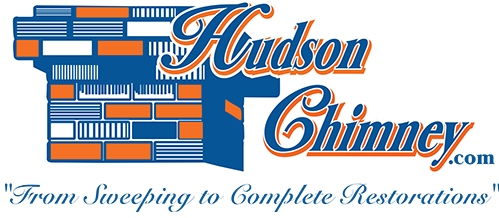by Mark Hudson | Oct 15, 2014 | Chimney Cap
Does your chimney have a cap? A chimney cap may seem insignificant and maybe not that important, but it serves a variety of functions to protect your chimney and home! The Chimney Safety Institute of America suggests that all chimneys have caps as a preventative measure against damage and for safety reasons. If you do not have a chimney cap or your chimney cap needs to be replaced, it is important that you call Hudson Chimney as soon as possible to install a cap in order to prevent the damages associated with not owning one.
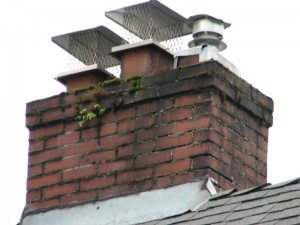
There are many reasons why it is important to keep your chimney capped. A chimney cap stops rain from getting into your chimney, preventing water damage to both your chimney and your home. Water damage can cost you a lot of money in repairs as well as destroy your chimney if not confronted quickly. While a chimney cap is important to preventing water from entering your chimney, water damage can also be prevented by having the professionals at Hudson Chimney apply a sealant to the exterior of your chimney.
A chimney cap also keeps animals out of your chimney, which can create noise, smells, and provide them an entrance into your home. Chimney caps prevent environmental debris, such as sticks and leaves, from entering your chimney as well, which can cause dangerous chimney fires. Having debris or animals in your chimney can also block smoke and fumes from efficiently leaving your chimney, which will lead to improper ventilation that will not allow dangerous fumes to exit your home. Because they prevent things from entering and blocking your chimney, chimney caps ensure that your chimney’s air flow runs efficiently. Chimney caps also help to eliminate downdrafts, which blow cold air as well as fumes from your fire back into your home. A chimney cap also protects your chimney liner and prevents sparks from flying out of your chimney and lighting things on fire.
If you are looking for a sturdy and durable chimney cap that doesn’t rust, Hudson Chimney can install a stainless steel cap for you. However, you also have the options of having a copper, galvanized, or aluminum cap installed. Consult with an expert at Hudson Chimney to determine the best cap for your chimney. No matter your choice, chimney caps are one of the least expensive chimney repairs that can be made as well as one of the simplest. Therefore, it makes financial sense to have a chimney cap installed rather than waiting for damages to occur that will cost you more!
So if you don’t have a chimney cap or if your chimney cap needs to be replaced, give Hudson Chimney a call as soon as possible. The professionals there will be sure that you have a cap installed that will protect your chimney and home.
by Mark Hudson | Sep 30, 2014 | CSIA Certified
When looking for a chimney sweep to entrust with the task of cleaning and inspecting your chimney, you may wonder how you are supposed to distinguish a good chimney sweep from a bad one. After all, you want to hire a professional who knows what he or she is doing and who can help you to protect your home from the dangers that owning a chimney can present. The Chimney Safety Institute of America is a non-profit organization that reviews and certifies chimney sweep companies in order to provide homeowners with a standard for their chimney needs.
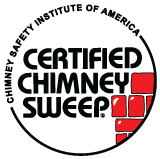
To be CSIA certified, a chimney technician must attend a review session and pass an exam covering Successful Chimney Sweeping (2011), National Fire Protection Agency 211 (2013), and the 2006 International Residential Code. Anyone applying for certification must also sign the CSIA code of ethics and pay an annual fee. In order to remain certified, this process must be repeated by the technician every three years.
These procedures for certification create a method for homeowners to determine if a chimney sweep is qualified to clean and inspect a chimney in a professional and informed manner. Chimneys and appliances can cause fires and carbon monoxide leaks if not properly maintained. Therefore, making sure your chimney sweep knows what he or she is doing in addition to being dedicated to helping you detect and fix potential problems is of the utmost importance.
It is significant to note that the CSIA not only seeks to educate and evaluate technicians, but also to provide an ethical code for professionals to follow. When technicians sign this code, they pledge to conduct business in an honest and fair manner, as well as to remain knowledgeable and up to date on all chimney standards and procedures. They also agree to do their best to educate you, the consumer, and to act in a professional and respectful manner.
Hudson Chimney is certified by the CSIA, so you can be sure that you will be in good hands. The technicians at Hudson Chimney have been servicing the Jacksonville, Florida Area for over thirty years, ensuring their clients clean, safe, and warm homes with efficient heating systems. You can trust the professionals at Hudson Chimney to be knowledgeable in their skills and to provide you and your appliances with service of the highest quality.
If you have any questions about CSIA certification or policies, or if you have any questions about chimneys and appliances as a homeowner, be sure to check out CSIA.org for more information. Their website is an informative and reliable resource of educational material for your benefit.
Also, if your chimney has not been serviced this year yet, schedule an appointment with a technician at Hudson Chimney as soon as possible. The fall and winter are busy for any chimney servicing company, and the sooner you call, the more likely your home will be prepared for the colder winter months. The professionals at Hudson Chimney will make sure your chimney is prepared!
by Mark Hudson | Aug 25, 2014 | chimney maintenance
There are a lot of risks involved with having a chimney. Chimney fires, carbon monoxide poisoning, and expensive repairs are some of the more worrisome problems. However, you can protect your home, your health, and your wallet easily with early preventative maintenance. Hudson Chimney can inspect and clean your chimney, make sure it is properly installed, and make and carry out recommendations that will keep your home safe and maintained.
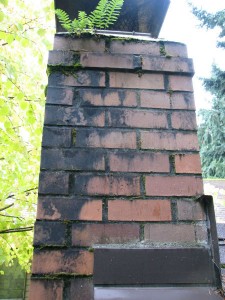
One easy way to prevent chimney fires and ventilation problems is to have your chimney cleaned professionally. The Chimney Safety Institute of America recommends that you have your chimney swept annually. Whenever you use your chimney, a substance called creosote builds up. Creosote is both highly flammable and blocks smoke and gasses from leaving your home. Furthermore, creosote can build up into glazed creosote, which has to be removed by a professional with chemicals to avoid ruining your chimney. The professionals at Hudson Chimney would be more than happy to inspect your chimney for creosote buildup and clean it to provide you with a safer home.
Water that enters your chimney can also cause extensive water damage, including mold growth, insulation damage, and even the destruction of your chimney. In order to prevent water from entering your home through your chimney, you should have Hudson Chimney install a cap or damper (every chimney should have one of the two). A cover will not only prevent water from entering and damaging your home, but it will also prevent animals and other debris from getting inside your chimney. Keeping your chimney clear of animals and debris is important for proper ventilation and keeping toxins out of your home.
Water can also seep through the brick or mortar of your chimney, however. This can also cause water damage to your home as well as cause cracks to form and be enlarged, shortening the life span of your chimney. Therefore, it is important to have Hudson Chimney apply a repellent to your chimney stack. A repellent will prevent water from seeping into the materials of your chimney while still allowing it to breathe, which enables water produced in your chimney to leave it.
You should have Hudson Chimney inspect your chimney to make sure that it is also installed correctly. Sometimes an appliance can have a flue that is too big or too small for it, causing draft problems. With a flue that is too small, ventilation will not occur properly, allowing toxins to enter your home. With a flue that is too big, on the other hand, creosote will quickly build up, causing a fire hazard and also preventing proper drafting.
If you are worried about the potential disasters your chimney can cause, you will find how easy it is for you to protect yourself and your home by calling Hudson Chimney. They will make sure that your chimney is working safely and efficiently and put your mind at ease.
by Mark Hudson | Sep 13, 2013 | fireplaces
Wood vs. Gas Fireplace
There is something comforting about gathering around a fireplace when the weather is cold. Those who already have them in their homes can count themselves lucky. But what if you are looking to add one to your home? Should you choose wood-burning or gas? This is a debate that has been going on for years, but the reality is that there are advantages and disadvantages to both.
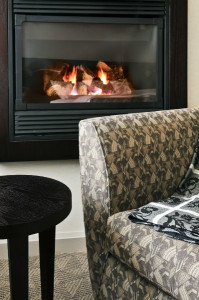
There are advantages and disadvantages for both wood and gas fireplaces. A certified sweep can help you make the best decision for your lifestyle.
Most real estate agents agree that adding a fireplace of any kind will add value to a home but a wood burning fireplace will most likely add a little more than a gas fireplace. Most people enjoy the authentic nature of a wood burning fireplace and having heating and cooking independence from utility companies is a big plus. When the power goes out those with wood-burning fireplaces will have heat and cooked food. They also provide a convenient way to dispose of fallen branches or other wood debris that may have collected around a property. There is also something to be said about the atmosphere a wood-burning fireplace creates that is unmatched by any of its contemporaries. There are however some disadvantages. Wood-burning fireplaces can be messy and expensive to maintain. The burning of wood produces gases that will cool as they go up the chimney and turn into creosote which will stick to the sides of the chimney and can create a fire-hazard. This requires that the chimney be regularly cleaned. The cost of owning and operating a wood-burning fireplace is also higher than it is to operate a gas fireplace. Gas is cheap and burns cleaner than wood and takes a lot less time and maintenance to operate.
To those who may not want to deal with the mess and maintenance or a wood-burning fireplace gas logs may be the answer. Gas logs are dependent on the gas supply but they are cleaner burning options and offer a measure of safety. You don’t have to worry about a stray spark igniting your home and there is no need to stock up on firewood. The cleaning and maintenance of a chimney with gas logs is much less than that of a wood-burning fireplace but it still requires some attention especially if it was originally a wood-burning system. Water can do more damage to a chimney than fire and if unchecked can cause extensive damage.
Whether you choose wood-burning or gas logs a fireplace is a great addition to any home with the proper respect. They both produce fire and both must be protected from children and pets and require proper maintenance to maintain a safe functionality. If you do that you will be happy with whatever decision you make.
